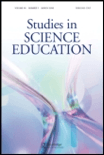
Studies in Science Education
Scope & Guideline
Fostering Insightful Discussions in Science Learning
Introduction
Aims and Scopes
- Innovative pedagogical approaches:
The journal emphasizes research on innovative teaching strategies and pedagogical frameworks that enhance science education, including inquiry-based learning, project-based learning, and the use of technology in classrooms. - Critical reviews and systematic analyses:
It publishes systematic reviews and critical analyses of existing literature in science education, providing a comprehensive overview of current knowledge, challenges, and gaps in the field. - Interdisciplinary perspectives:
The journal encourages interdisciplinary research that connects science education with other fields such as environmental studies, gender studies, and technology, highlighting the multifaceted nature of science learning. - Focus on diverse learner experiences:
Research exploring the experiences of diverse learner populations in science education, including underrepresented groups in STEM fields, is a key focus area. - Teacher identity and professional development:
The journal addresses the importance of teacher identity, preparation, and ongoing professional development in fostering effective science instruction. - Assessment and evaluation in science education:
It investigates various assessment strategies and their impact on student learning and engagement in science.
Trending and Emerging
- Climate change education:
There is a growing emphasis on climate change education, reflecting the urgent need to address environmental issues and prepare students for challenges related to sustainability. - Inclusivity and diversity in STEM:
Research focusing on inclusivity and the experiences of underrepresented groups in STEM fields has gained traction, underscoring the importance of equitable access to science education. - Technology-enhanced learning:
The integration of technology, particularly immersive and interactive learning environments, is a significant trend, indicating a shift towards modernizing science education practices. - Metacognition in science learning:
Recent studies highlight the role of metacognition in science learning, suggesting a growing interest in how students think about their own learning processes and strategies. - Interdisciplinary approaches to science education:
There is an increasing trend towards interdisciplinary research, integrating science education with other fields such as social sciences and humanities to enrich the learning experience.
Declining or Waning
- Traditional laboratory work:
Research specifically centered on traditional laboratory work in secondary education has become less prominent, indicating a shift towards more innovative and engaging approaches to science education. - Disciplinary boundaries in science education:
There appears to be a declining emphasis on strict disciplinary boundaries in science education, with fewer studies focusing solely on traditional subject-specific methodologies. - Basic science content knowledge:
There is a noticeable reduction in research focused on basic content knowledge in isolation, suggesting a move towards more integrative and holistic educational approaches. - Standardized testing impacts:
The impact of standardized testing on science education seems to be receiving less attention, possibly due to a growing focus on alternative assessment methods and educational practices.
Similar Journals
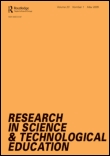
Research in Science & Technological Education
Advancing the Future of STEM EducationResearch in Science & Technological Education, published by Routledge Journals, Taylor & Francis Ltd, is a leading international journal dedicated to advancing the field of education within the realms of science and technology. With its ISSN 0263-5143 and E-ISSN 1470-1138, this prestigious journal provides a platform for innovative and rigorous research from 1983 to the present, thus offering critical insights into pedagogical practices, curriculum development, and policy-making. Boasting a remarkable impact, it ranks in the top quartile (Q1) in both Education and Multidisciplinary categories as of 2023, with an impressive Scopus ranking of #270 out of 1543 in Social Sciences _ Education, placing it in the 82nd percentile. Researchers, educators, and students will find invaluable resources and discussions that shape the future of science and technological education in an increasingly complex world. Although this journal does not offer Open Access, it maintains a strong commitment to disseminating high-quality research, making it an essential read for those invested in the evolution of educational practices and outcomes in the STEM fields.

MIER-Journal of Educational Studies Trends and Practices
Fostering scholarly dialogue for impactful educational change.MIER-Journal of Educational Studies Trends and Practices is a pivotal academic journal dedicated to advancing the field of education, focusing on innovative research and trends that influence teaching and learning practices. Published by the esteemed MODEL INST EDUCATION & RESEARCH, this journal offers a platform for researchers, educators, and students to disseminate knowledge and insights on various educational methodologies, curricular developments, and pedagogical theories. While the journal's current impact factor is not specified, its commitment to fostering scholarly discourse positions it as a notable contributor to the field. With an ISSN of 0976-8203 and an E-ISSN of 2319-1945, MIER aims to promote open access to current educational research, making it accessible to a global audience. By engaging with contemporary educational issues and emerging practices, this journal serves as a valuable resource for those dedicated to enhancing educational outcomes and developing effective teaching strategies.
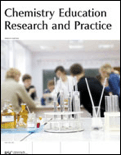
Chemistry Education Research and Practice
Elevating Chemistry Instruction with Rigorous ResearchChemistry Education Research and Practice is a prominent journal dedicated to advancing the field of chemistry education through rigorous research and innovative practices. Published by the Royal Society of Chemistry, this journal, with an ISSN of 1109-4028 and an E-ISSN of 1756-1108, operates out of Greece and has established itself as a leading voice in the intersection of chemistry and educational methodology. With a remarkable impact factor and ranking in the top quartiles (Q1) for both Chemistry and Education in 2023, it appeals to a diverse audience of researchers, educators, and practitioners who are passionate about enhancing chemistry instruction and learning experiences. The journal spans a wide range of topics, aiming to promote and disseminate high-quality research that informs pedagogical strategies, curriculum development, and educational policy. By providing a platform for vibrant discussions and new ideas, Chemistry Education Research and Practice plays a crucial role in shaping the future of chemistry education worldwide and continues to impact the academic community significantly.
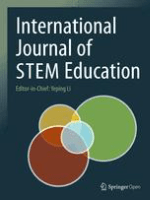
International Journal of STEM Education
Fostering Excellence in Science, Technology, Engineering, and Mathematics EducationThe International Journal of STEM Education, published by Springer, is a leading open-access journal dedicated to advancing the field of STEM (Science, Technology, Engineering, and Mathematics) education. With its ISSN 2196-7822 and e-ISSN 2196-7822, the journal has established a significant presence in its domain since its launch in 2014, operating with an increased depth of scholarship through 2024. Hailing from Switzerland and addressing a global audience, the journal has achieved a remarkable ranking of Q1 in Education for 2023, placing it in the top tier of its field. The journal is ranked 26th out of 1543 in Social Sciences - Education according to Scopus metrics, highlighting its influence in shaping contemporary educational practices. By offering a platform for high-quality research articles, reviews, and case studies, the International Journal of STEM Education aims to promote effective teaching methodologies and innovation in STEM pedagogy, catering to researchers, educators, and policy makers alike. The commitment to open access ensures that the knowledge generated is readily available, fostering collaboration and dissemination of cutting-edge developments in STEM education.

International Journal of Education in Mathematics Science and Technology
Exploring new horizons in mathematics, science, and technology education.The International Journal of Education in Mathematics Science and Technology (ISSN: 2147-611X, E-ISSN: 2147-611X) is an esteemed publication dedicated to advancing knowledge and research in the fields of mathematics, science, and technology education. Published by Necmettin Erbakan University in Turkey, this journal serves as a vital platform for educators, researchers, and professionals to disseminate innovative methodologies, pedagogical strategies, and educational technologies. With a commendable Q2 ranking in both the Education and Mathematics categories for the year 2022, it clearly exemplifies its impact in these domains, boasting a Scopus rank of #19 out of 74 in Mathematics (miscellaneous) and a position in the 75th percentile. Although the journal has transitioned into open access, it remains committed to fostering a rich dialogue among scholars and practitioners dedicated to enhancing educational outcomes in mathematics and science. Researchers and educators interested in contributing to pedagogical advancements are encouraged to submit their work, thereby playing a part in influencing the future of education.

International Journal of Instruction
Fostering collaboration among scholars and practitioners worldwide.International Journal of Instruction is a distinguished peer-reviewed journal dedicated to advancing the field of education through high-quality research and innovative instructional practices. Published by GATE Association for Teaching & Education in Switzerland, this open-access journal has been a beacon of knowledge since its inception in 2008, ensuring that impactful educational research is freely accessible to scholars, educators, and practitioners worldwide. With an impressive Q2 ranking in Education and a notable position in the 80th percentile within its category in Scopus, the journal showcases cutting-edge studies and discussions that reflect current trends and methodologies in teaching and learning. The scope of the journal includes a wide array of topics, ranging from instructional strategies to curriculum development, making it a vital resource for anyone engaged in the dynamic landscape of education. Explore the International Journal of Instruction today to contribute to and benefit from the collective wisdom of the global educational community.

International Journal of Technology in Education
Empowering Education Through TechnologyThe International Journal of Technology in Education, published by the International Society for Technology Education & Science (ISTES), serves as a vital platform for researchers, educators, and practitioners devoted to the intersection of technology and educational practices. With an E-ISSN of 2689-2758, this journal aims to showcase innovative research, case studies, and theoretical contributions that explore how emerging technologies can enhance teaching and learning. Although specific metrics like impact factor and HIndex are currently unavailable, the journal is committed to rigorous peer review and high academic standards, ensuring that all published work contributes meaningfully to the evolving landscape of educational technology. As an open-access journal, it strives to make research widely available, fostering collaboration and knowledge sharing among its audience. Whether you are a researcher exploring new horizons or a professional seeking practical applications of technology in education, the International Journal of Technology in Education is an indispensable resource.
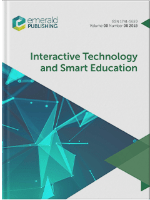
Interactive Technology and Smart Education
Exploring the synergy of technology and education for a smarter tomorrow.Interactive Technology and Smart Education is a leading academic journal published by EMERALD GROUP PUBLISHING LTD, dedicated to exploring the dynamic intersection of technology and education. With a robust impact factor signifying its significant contributions to the field, this journal consistently ranks in the Q1 quartile in categories such as Computer Science (Miscellaneous), Education, and E-learning, reflecting its prestige and wide-ranging influence. A staple for researchers, educators, and industry professionals, the journal addresses innovative practices and developments in interactive technologies that enhance teaching and learning experiences. Operating from its base in the United Kingdom, the journal spans nearly two decades of impactful publishing, featuring high-quality research that plays a crucial role in shaping the future of education through technology. Scholars seeking to stay at the forefront of this evolving field are encouraged to contribute and engage with the journal's pioneering work.

Malaysian Journal of Learning & Instruction
Connecting researchers to inspire transformative learning.Welcome to the Malaysian Journal of Learning & Instruction, a prestigious open-access journal published by UNIV UTARA MALAYSIA PRESS since 2004. With a focus on advancing knowledge in the fields of education, cultural studies, and psychology, this journal serves as a vital platform for researchers, educators, and professionals to share innovative findings that address contemporary challenges in learning and instructional practices. The journal has gained recognition within the academic community, proudly achieving a Q1 ranking in Cultural Studies and a Q2 ranking in Education as of 2023, reflecting its commitment to high-quality research. Furthermore, with an impressive 94th percentile ranking in Social Sciences—Cultural Studies, it stands as a leader in fostering impactful scholarship. Researchers interested in the intersection of educational psychology and cultural discourse will find this journal to be an invaluable resource. Join us in exploring groundbreaking insights that shape the future of education and instruction.

International Journal of Education and Information Technologies
Fostering Research that Transforms Learning EnvironmentsWelcome to the International Journal of Education and Information Technologies, a leading academic platform published by NORTH ATLANTIC UNIV UNION-NAUN. With an emphasis on the integration of education and information technology, this journal aims to foster innovative research and discussions that enhance pedagogical practices and technological advancements in educational contexts. Although currently an open access journal, it provides unrestricted access to emerging studies that are crucial for educators, researchers, and professionals aiming to stay at the forefront of education technology. While specific metrics such as H-index and Scopus ranks are yet to be defined, its ISSN 2074-1316 signifies its credibility and commitment to quality scholarship. This journal serves as a vital resource for those passionate about bridging the gap between technology and education, encouraging impactful research that shapes the future of learning environments.